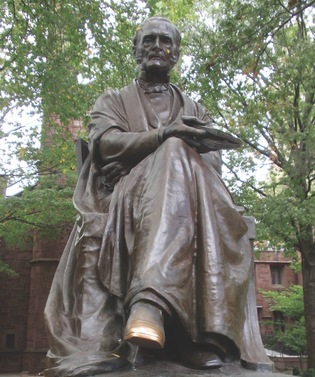 loading
loading
Old YaleYale's first global presidentTheodore Dwight Woolsey connected Yale to the world. Judith Ann Schiff is chief research archivist at the Yale University Library.  Wikimedia CommonsA statue of Theodore Dwight Woolsey, who led Yale from 1846 to 1871, presides over Old Campus; tour guides encourage visitors to rub the statue’s toe for luck. View full imageThe university today is fond of saying that “global engagement is core to Yale’s mission.” Such engagement is deeply rooted in Yale’s past. In the mid-nineteenth century, President Theodore Dwight Woolsey (1801–1889) took some important steps toward making Yale more global. Woolsey’s predecessors Timothy Dwight (in office from 1795 to 1817), and Jeremiah Day (1817–1846), inspired Yale-educated missionaries to preach and teach in Hawaii, Asia, and Africa. Immediately succeeding Day, Woolsey, from 1846 to 1871, improved the college course of study and developed Yale’s cluster of fledgling schools into a modern university. Over his 25-year administration, the creation of new professorships enabled Yale scholars to earn recognition in Europe and translations of their textbooks to be preferred by East Asian universities. Concurrently, Woolsey welcomed and educated the first international students. Woolsey was the son of William Walton Woolsey, a prosperous Manhattan merchant, and Elizabeth Dwight, sister of President Dwight and granddaughter of Jonathan Edwards, Class of 1720. Valedictorian of the Class of 1820, Woolsey was undecided on a career and studied law in Philadelphia with Charles Chauncey and theology at Princeton and Yale. From 1823 to 1825, he was a Yale tutor—responsible for instruction to a class or section of a class. Political and social conditions also concerned him. In 1825, Woolsey, Leonard Bacon ’20, Edward Beecher ’22 (brother of Harriet Beecher Stowe and Henry Ward Beecher), and others founded an anti-slavery association that became the African Improvement Society of New Haven. (Later, during Woolsey’s presidency, the first African American graduates of Yale would earn their diplomas: Cornelius V. Creed from the medical school and Richard Green from the college, both in 1857.) He then studied abroad for three years, mainly in Germany. One of the first Americans to have the opportunity to study with renowned German scholars, Woolsey said that the experience greatly deepened his love of learning and teaching. In 1831, he was elected to a new professorship of Greek language and literature in Yale College. By 1846, Woolsey was the clear choice for president. He was selected by the trustees, but there was a problem: a Yale president had to be an ordained minister. Woolsey had been licensed to preach, but not ordained. On October 26, 1846, he was ordained. Woolsey improved every area of Yale and established new programs to form a great American university. To the four endowed professorships established prior to 1846, eleven were added under Woolsey, including philosophy, geology, Sanskrit and comparative philology, modern languages, New Testament criticism, botany, ecclesiastical history, Hebrew language and literature, and mechanical engineering. In 1850, Woolsey admitted Yale’s first Chinese student, Yung Wing, to the freshman class. Four years later, Wing became the first Chinese person to graduate from an American college. Woolsey also admitted Yale’s first Japanese student, listed in Yale alumni records as Ohara Reynoske. A non-graduate of the Law School Class of 1872, he is entered in their catalog as a junior in 1870–71. Other students came from Japan over many years, and Woolsey’s publications especially on international law were widely read in English and in translation in Japan. In his book Helpful Thoughts for Young Men, Woolsey summed up his love for Yale: “There may be new institutions better than Yale: we claim no superiority nor suppose that we have reached perfection. But we love our College better than we can some result of modern experiment, because it is venerable, because it is deserving of love and because it is ours.”
The comment period has expired.
|
|